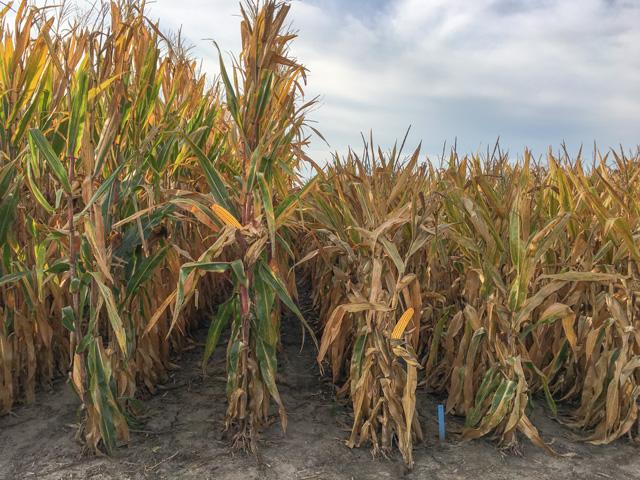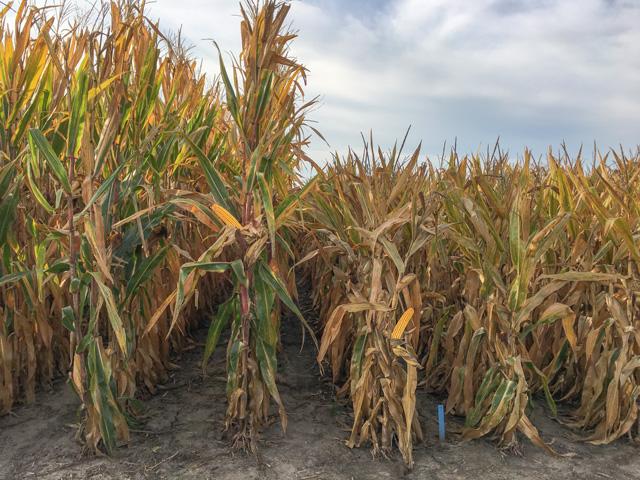Production Blog
Bayer Updates Pipeline: Short-Corn Trait Advances
DECATUR, Ill. (DTN) -- Bayer has announced several key crop pipeline advances. Most notably the agrichemical and seed company pushed ahead its short-stature corn project which will see test plantings on selected farmer fields in 2023 with broader commercialization anticipated in the United States in 2024.
Key Bayer research and development spokespeople presented details about the advancements on a call with journalists on Feb. 17.
Among the announcements was an herbicide that could represent a new active ingredient noted for activity against grassy weeds for use in row crops. Farmers have clamored for new tools as weeds increasingly have become resistant to many herbicides. No herbicide with a new molecular site of action (SOA) has been developed since the 1980s.
Rachel Rama, Bayer Head of Small Molecules, said farmers could see the new herbicide, which is being designed for major broad acre crops, by the end of the decade (2030) if it continues to meet testing protocols and clears regulatory hurdles.
SHORT-CORN SYSTEM
It is short-stature corn that has Bayer's Head of Research and Development Bob Reiter looking eagerly looking ahead. Short-stature hybrids stand about a third to half the height of standard corn hybrids with an ear that sets about knee high.
The hybrids debuted in Mexico under the brand name Vitala. The company is now advancing the concept through their U.S. pipeline in three separate versions -- traditional breeding, genetically engineered and gene edited.
Bayer plans for U.S. farmers to get a sneak peak in 2023 as the company works with a limited number of hand-picked growers as part of what the company calls its Ground Breakers Field Trial Program. The company expects to ramp up seed production with a broader commercial rollout expected in 2024. Biotech versions could come by 2027, followed gene edited hybrids.
The idea is to create hybrids that potentially use less resources and are easier to negotiate when in-crop applications of inputs are needed. Shrinking the corn plant is also expected to improve standability, including lower green snap risk and better stalk lodging tolerance and to help withstand extreme weather like high winds.
P[L1] D[0x0] M[300x250] OOP[F] ADUNIT[] T[]
Reiter stressed that short-stature corn opens an opportunity to think differently about how the company brings products to market. Instead of trait, product or seed, the company is developing a growing system that utilizes Bayer's entire portfolio of digital tools, seed and crop protection prescriptions and overall crop health management, he explained.
BIOTECH OFFERINGS AND MORE
Bayer's ThryvOn cotton, the first biotechnology trait to protect against sucking and piercing insects, heads to the field this year. Awaiting some import approvals, the company will offer it as a stewarded launch in 2022 and stacked with Bollgard 3 XtendFlex Technology.
Bollgard 4 cotton moves into Phase 3 of the pipeline, offering season-long protection with multiple modes of action for key lepidopteran pests. HT4 cotton with five herbicide tolerances (glyphosate, glufosinate, dicamba, HPPD and PPO) is advancing to Phase 3 in Bayer's product pipeline.
Corn rootworm is also in the crosshairs as the company launches SmartStax Pro on a limited scale this year with a broader launch in 2023. It combines existing Bt proteins within SmartStax with a trait that uses a technology called RNA-interference (RNAi).
No discussion is complete these days without a mention of carbon sequestration. Bayer is digging in here too. Reiter said the company's carbon initiative has 2500 farmer customers participating across the U.S. and Brazil.
Rewarding farmers to do the right thing allows the company to further invest in innovation, Reiter said. "We can use our biotechnology tools, our crop protection tools, our biologics, and our breeding programs to further help in this objective of sequestering carbon, putting it into the ground and keeping it in the ground," he said.
PRECISION BREEDING TACTICS
Reiter, who was trained as a plant breeder, discussed the new changes coming as precision breeding determines what seeds advance to market.
"In the past, breeders would make crosses and create large populations. And we would go through a process of selecting what we would believe was the best. We would test it in many environments, and ultimately try to place those products where we thought they had a best fit for the grower.
"With precision breeding, we are turning all of this on its head. We're designing in advance through our incredible knowledge that we now have of our germplasm -- our field knowledge, our genomic knowledge -- the tools that we're applying in terms of creating information about each individual plant that we have," Reiter said. "And this gives us the power together with things like artificial intelligence, the vast data capabilities we have, an ability to bring it all together from a genetic perspective in our large greenhouse capabilities. And then, we can place them on the right environment in the right situations to have grower customers have great success."
He added that it will be a few years until products come out of precision breeding, but he sees step-change products ahead. Only in the past five to 10 years has the computational power and know-how been available to make precision breeding work, he noted.
To read more about the Bayer pipeline innovations in the U.S. and other countries go to: https://media.bayer.com/…
To read more about ThyrvOn technology: https://www.dtnpf.com/…
To read more about SmartStax Pro: https://www.dtnpf.com/…
To read more on short-stature hybrids https://www.dtnpf.com/…
Pamela Smith can be reached at pamela.smith@dtn.com
Follow her on Twitter @PamSmithDTN
(c) Copyright 2022 DTN, LLC. All rights reserved.






Comments
To comment, please Log In or Join our Community .